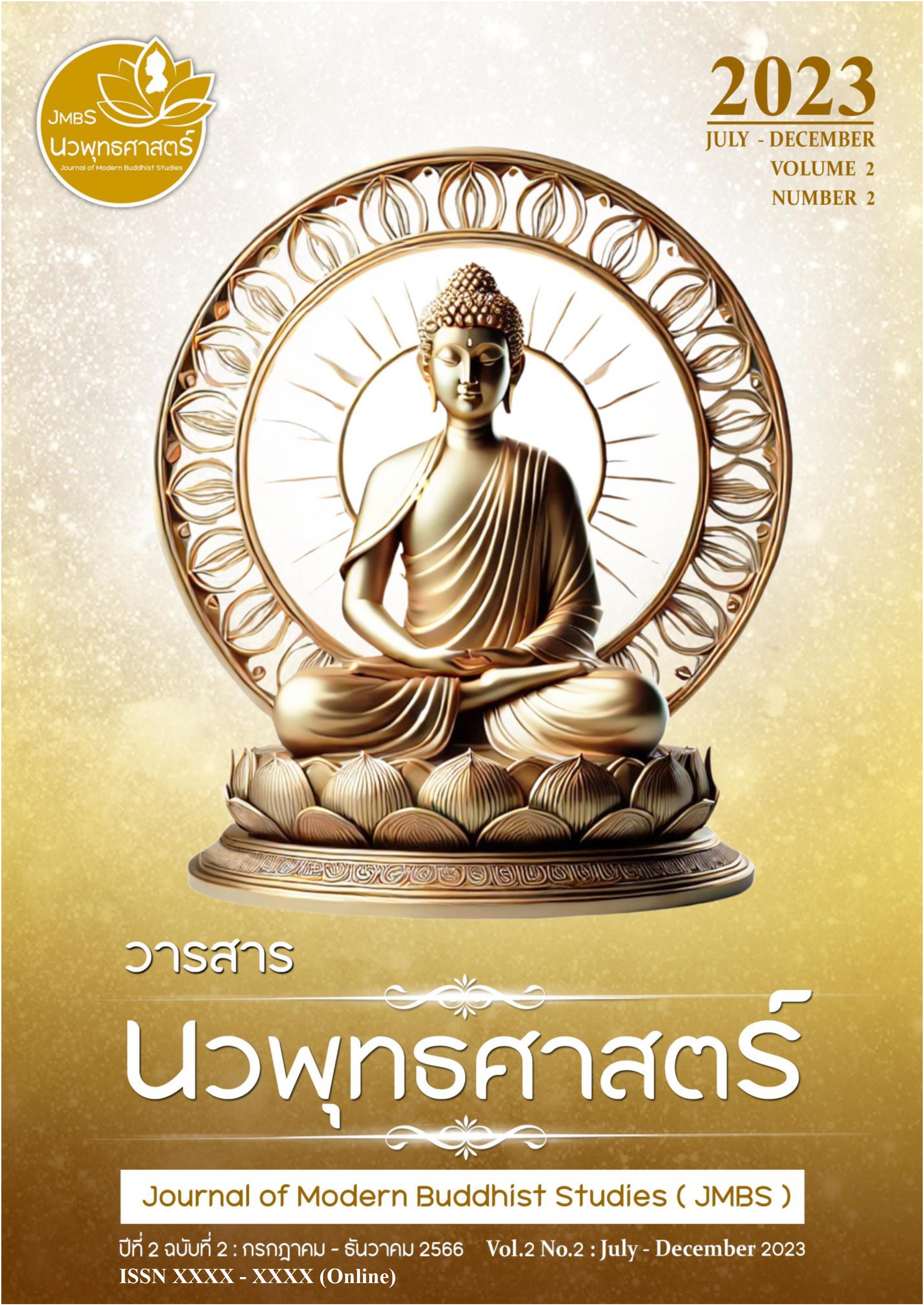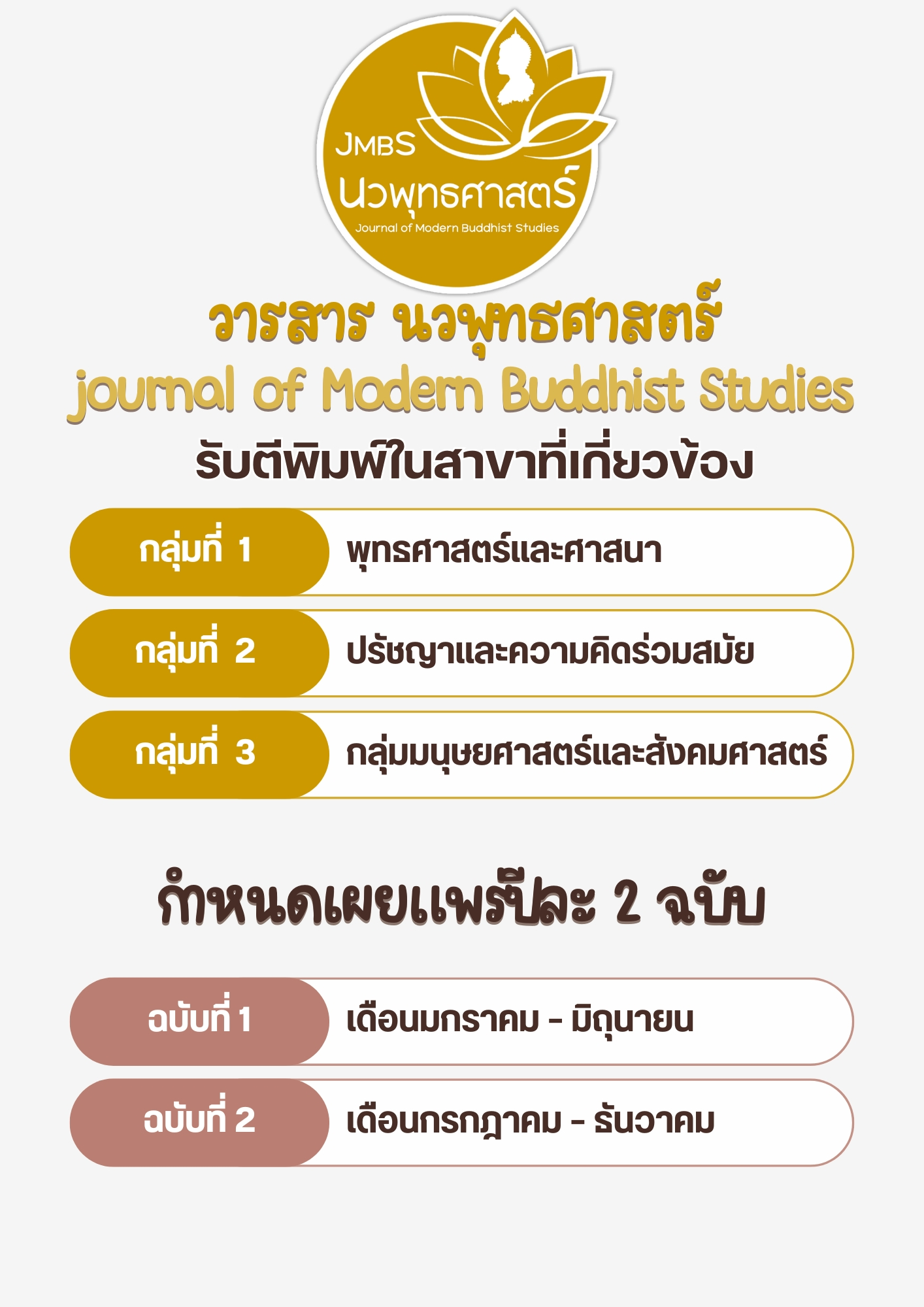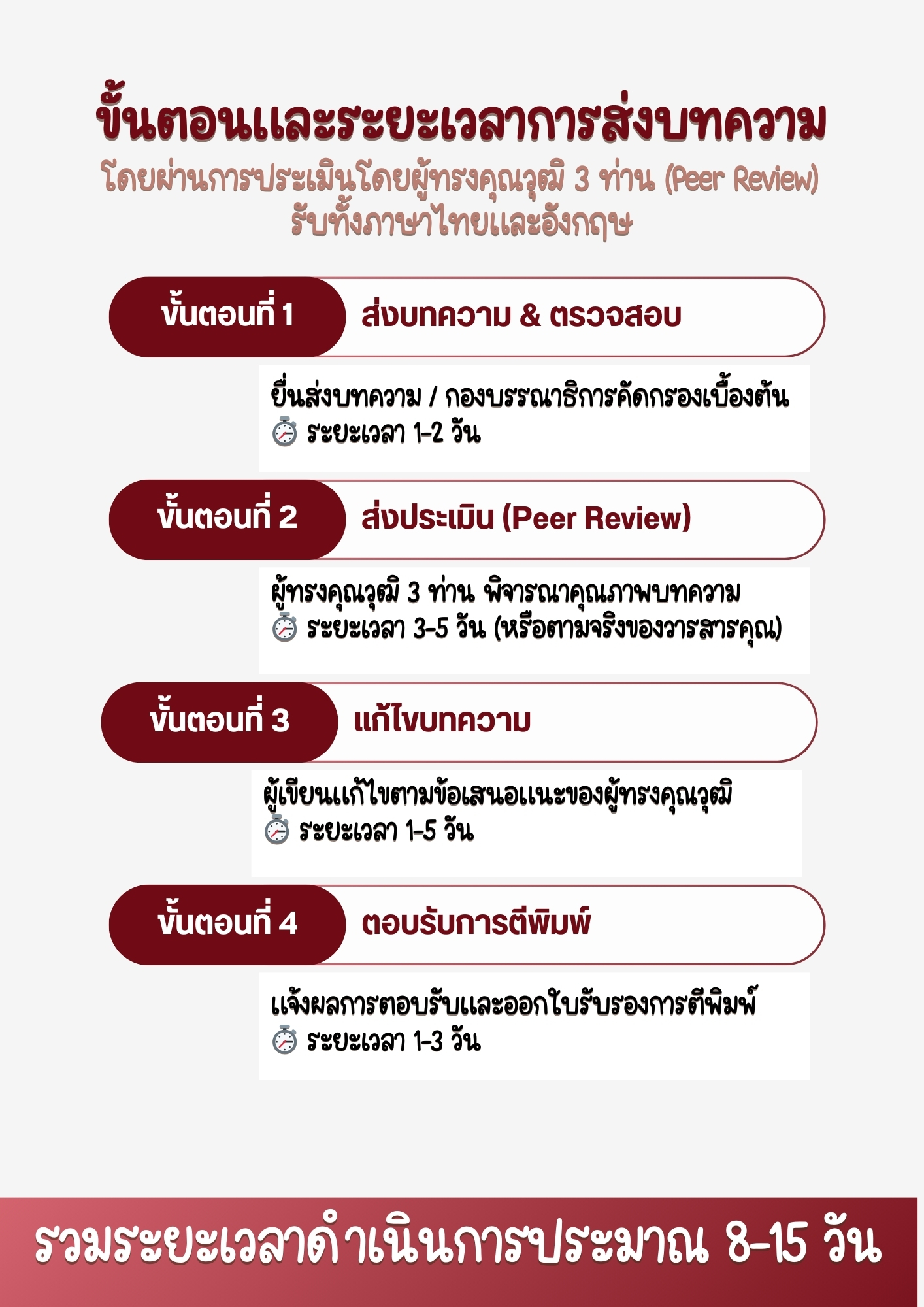SOCIAL STUDIES IN BUDDHIST WAY: APPLYING BUDDHIST PRINCIPLES TO LEARNING TO REDUCE STRESS AMONG STUDENTS
Keywords:
Social studies of Buddhist way, application of Buddhist principles, reducing stress of studentsAbstract
This academic article aims to study the application of Buddhist principles in social studies teaching to reduce stress and promote emotional development of basic education students. The principles used include the Four Bases of Power to create motivation for learning and the Four Foundations of Mindfulness to enhance emotional awareness. In addition, the Four Divine Abodes are integrated to create a warm and emotionally safe learning atmosphere. The results of the study found that teaching and learning that integrates Buddhist principles significantly reduces students' stress by promoting self-awareness, emotional control, and reduced pressure from studying. Appropriate learning activities include meditation before starting a lesson, mindfulness training through brainstorming activities, discussions, and reflection on lessons, which help students concentrate and be more ready to learn. Creating cooperation between teachers and parents is an important factor that helps promote good behavior, appropriate adjustment to pressures in daily life, and creating a good learning environment, which helps to promote and develop students' personalities and clear minds. The application of Buddhist principles in social studies teaching helps reduce stress and promotes students' emotional development. Learning development along with the promotion of good consciousness is an appropriate approach to education management in the present era to create individuals with balanced thoughts, emotions, and behaviors, ready to live morally in a society that is constantly changing.
References
กรมสุขภาพจิต (2543). คู่มือคลายเครียด. พิมพ์ครั้งที่ 4. กรุงเทพมหานคร: สยามเอ็มแอนด์บีพับลิชชิ่ง.
กรมสุขภาพจิต (2566). สภาวะอารมณ์ที่ไม่คงที่ในวัยรุ่น (ตอนที่ 1). [ออนไลน์], แหล่งที่มา: https://dmh.go.th/news/view.asp?id=2503.
คณะอนุกรรมการปฏิรูปการเรียนรู้ (2543). ปฏิรูปการเรียนรู้ ผู้เรียนสำคัญที่สุด. พิมพ์ครั้งที่ 5. กรุงเทพมหานคร: สำนักคณะกรรมการการศึกษาแห่งชาติ.
จินตนา พัฒนพงศ์ธร และคณะ (2561). การศึกษาปัจจัยที่มีผลต่อพัฒนาการเด็กปฐมวัย ครั้งที่ 6 ปี พ.ศ. 2560. “รายงานวิจัย”. กลุ่มสนับสนุนวิชาการและการวิจัย สำนักส่งเสริมสุขภาพ กรมอนามัย.
ดวงเดือน พันธุมนาวิน (2544). การบริหารงานบุคคลแผนใหม่. กรุงเทพมหานคร: ไทยวัฒนาพาณิช.
พระธรรมกิตติวงศ์ (2541). พระในบ้าน. กรุงเทพมหานคร: คำธาวรรณการพิมพ์.
พระธรรมปิฎก (2538). พุทธธรรม. พิมพ์ครั้งที่ 6. ฉบับปรับปรุงและขยายความ. กรุงเทพมหานคร : โรงพิมพ์มหาจุฬาลงกรณราชวิทยาลัย.
พิมพ์มาดา (2566). 101 วิธีกำจัดความเครียด. กรุงเทพมหานคร: กู๊ดไลฟ์.
ลิเดีย. “ความเครียด”. วารสารกรมบัญชีกลาง. ปีที่ 55 ฉบับที่ 2. (2557): 61-63.
วิภาพรรณ พิมลา. “แนวทางการจัดการเรียนรู้วิชาสังคมศึกษา เพื่อพัฒนาทักษะการคิดอย่างมี วิจารณญาณสำหรับผู้เรียนในศตวรรษที่ 21” . วารสารปาริชาต. ปีที่ 30 ฉบับที่ 1 (มกราคม- มิถุนายน 2560): 16.
วิโรจน์ ตระการวิจิตร (2557). เครียดอย่างฉลาด. กรุงเทพมหานคร: ดีเอ็มจี, 2557.
วิลาวัลย์ เอี่ยมเจริญ (2566). เทคนิคการสอนตามหลักการทั้งสี่ของอริยสัจ. [ออนไลน์]. แหล่งที่มา: https://www.bloggang.com/m/viewdiary.php?id=talatoppy&month=09-2007&date=15&group=2&gblog=1
ส่งเสริมสวัสดิการและพิทักษ์เด็ก เยาวชน ผู้ด้อยโอกาส คนพิการ และผู้สูงอายุ, สำนักงาน. กระทรวงการพัฒนาสังคมและความมั่นคงของมนุษย์ (2550). แนวทางการดำเนินงาน โครงการคาราวานเสริมสร้างเด็ก ปี 2550, (เอกสารอัดสำเนา).
สถาบันวิจัยประชากรและสังคม มหาวิทยาลัยมหิดล ร่วมกับสำนักงานกองทุนสนับสนุนการสร้างเสริมสุขภาพ (2566). สุขภาพคนไทย 2565: ครอบครัวไทยในวิกฤตโควิด-19. บริษัท อมรินทร์พรินติ้งแอนด์พับลิชชิ่ง จำกัด (มหาชน). [ออนไลน์]. แหล่งที่มา: https:// www.thaihealthreport.com/file_book/569-ThaiHealth2022-THFinal_compressed.pdf.
สำนักงานคณะกรรมการการศึกษาแห่งชาติ (2545). พระราชบัญญัติการศึกษาแห่งชาติ พ.ศ. 2542 และที่แก้ไขเพิ่มเติม (ฉบับที่ 2) พ.ศ. 2545. กรุงเทพมหานคร: พริกหวานกราฟฟิค.
สำนักงานรับรองมาตรฐานและประเมินคุณภาพการศึกษา (องค์การมหาชน) (2553). พระราชบัญญัติการศึกษาแห่งชาติ พ.ศ 2542, แก้ไขเพิ่มเติม (ฉบับที่ 3) 2553. กรุงเทพมหานคร: มปพ.
สุคนธ์ สินธพานนท์ (2559). การจัดการเรียนรู้ของครูยุคใหม่ เพื่อพัฒนาทักษะผู้เรียนในศตวรรษที่ 21. กรุงเทพมหานคร: ห้างหุ้นส่วนจำกัด 9119 เทคนิคพริ้นติ้ง.
อรทัย มูลคำ และสุวิทย์ มูลคำ (2544). การบรูณาการหลักสูตรและการเรียนการสอนโดยเน้นผู้เรียนเป็นสำคัญ เล่ม 2. พิมพ์ครั้งที่ 2. กรุงเทพมหานคร: ภาพพิมพ์.
Bee H (1995). The growing child. New York: Harper Collins College Publishers.

Downloads
Published
How to Cite
Issue
Section
License

This work is licensed under a Creative Commons Attribution-NonCommercial-NoDerivatives 4.0 International License.







